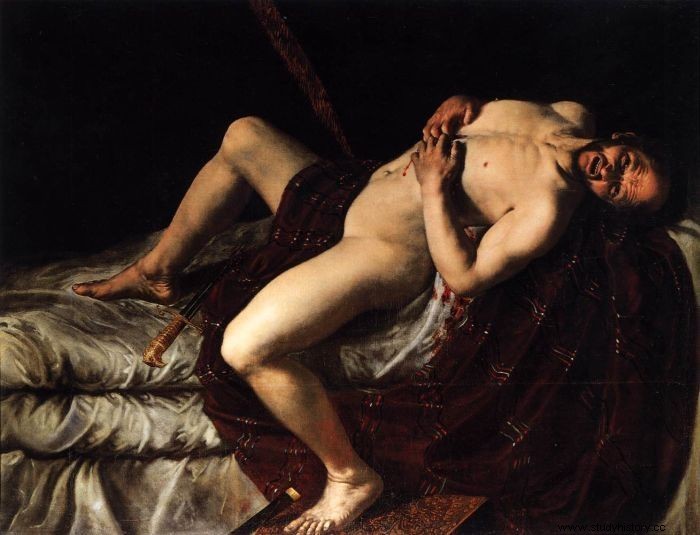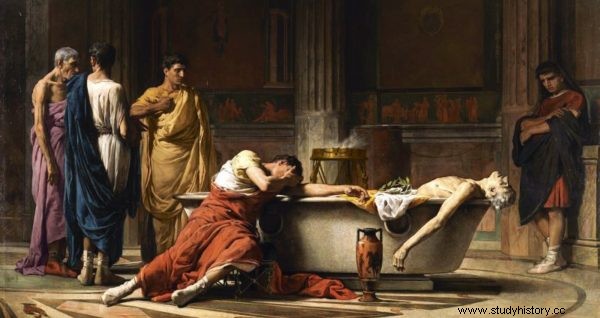Chestnut, veins cut in the bathtub and poisonous vipers. What was the attitude of the ancient Greeks and Romans to suicide? They were treated as cowardice, or on the contrary - an act of courage?
Christian tradition was forbidden to commit a suicidal act. Already the synod of Arles in 452 announced the first ban on suicide, the next ones introduced further restrictions. During the Synod in Orléans in 533, the Church declared suicide the worst crime for which it was punishable to prohibit the burial of a person committing such an act. The intensification of the restrictions continued. Christianity has changed people's mentality about taking their own lives. How was it in ancient Greece and Rome?
Greeks
This topic has been around for a long time among the Greek community. Pythagoras already believed that human life was controlled by gods and any interference in their decisions was a mistake . Other Greek philosophers we know - such as Plato and Socrates - also tended to condemn the act of taking one's own life. It is interesting, however, that the last of them just ended his life with suicide, and a poignant description of his death can be found, for example, in Plato's "Phaedon". Why did he make such a dramatic decision? While he believed that suicide was wrong and could lead to the wrath of the gods, was more about virtue and honor . When it was impossible to achieve inner harmony or we risked other people's disrespect - suicide was even required.

Death of Socrates
Plato thought similarly. Since human life loses meaning, e.g. during a serious illness, it seems justified to end it. Aristotle, on the other hand, was implacable in his negative view of suicide. He thought it was cowardly and spoiling the economic rights of the state as to the citizen. The Stoics quickly took advantage of the ideal of dying in style . The suicide death of Socrates has become a model - it looks like a perfectly directed spectacle, full of symbolism, mysticism, beauty and majesty.
Romans
Suicide in the Roman Empire was quite common. According to the Romans, taking one's own life was supposed to save from the defilement of honor, and also help avoid the impending defeat. Motivating suicide was important because taking your life solely for private reasons was considered reprehensible
From about the 1st century BC over the next two centuries, the scale of suicides in ancient Rome reached its apogee. Famous philosophers, emperors, politicians, even their family members committed suicides . After the defeat at Bedriacum, Emperor Marcus Salvius Oton (32-69 CE) stabbed himself with a knife, as did most of his soldiers (the lost battle, especially important, pushed to take his own life and was a kind of end to his military career). The same was done by Cato the Younger of Utycens (95 BCE - 46 BCE) after the Battle of Thapsus, Mark Antony (83 BCE - 30 BCE) after the naval battle of Actium, or Marcus Junius Brutus (85/78 BCE - 42 BCE) after the lost Battle of Philippi. Brutus's wife Porcja also committed suicide. Other women who bargained their lives include Cleopatra (69 BCE - 30 BCE) or the famous legendary figure - Lucretia (wife of Lucius Tarquinius Kollatin), who ends her life because she was raped. It was she who inspired painters such as Tycjan, Rembrandt and Botticelli and acted as a model of fidelity.

Cato's Suicide
A form of honorably ending life were also so-called forced suicides. On the orders of Nero (37 - 68 CE) Petronius (27 - 66 CE) and Lucius Anneus Seneca (4 - 65 CE) ended his life. It is interesting that Nero ended his life by stabbing himself with a dagger in his throat. Suicides were prevalent mainly among high-born people. Interestingly, a person who wanted to take his own life could have received poison from the representatives of the law. But it was different with the slaves. When a slave wanted to commit suicide, it was considered a financial loss, and the owner could return the slave (alive after a failed suicide attempt, or dead) to the previous owner within less than six months. In turn, a suicide committed by a soldier was considered desertion.
Ways
There were many ways to end your life, although the most popular seems to be: drinking poison (so-called hemlock - raging venomous and spotted tail sucker), cutting veins (usually with a bath in warm water, which stimulated blood circulation), or piercing with a dagger / sword. The aforementioned wife of Brutus - Portion was supposed to swallow hot coals, and Cleopatra was to be bitten by a poisonous snake.

Seneca's suicide
Although there were no written rules for taking one's own life, most of the event was staged anyway. Such a person informed their relatives about their intention and even organized a grand feast in which they participated. While playing and drinking wine, the participants of the feast discussed the issue of living with a future suicide.
Antiquity represented the total commonness of human life, making death an element of everyday life. Mass murders in the Roman Empire to the delight of the public were the norm, while theatrical suicides were their opposite - something dignified, ritualized and marked with a beautiful end to life.
Bibliography:
- Alvarez Al., God the Beast. A Study of Suicide, transl. Sommer Ł., Warsaw 2007.
- Kempys J, Suicide in the Ancient Romans based on the moral writings of Lucius Anneusz Seneca, Krakow 1997.
- A Little Encyclopedia of Ancient Culture, PWN Publishing House, Warsaw 1983.
- Marx J., The idea of suicide in philosophy from antiquity to the present day, Warsaw 2003.
- Suicide. Anthology of philosophical texts, ed. Sahaj T., Toruń 2008.
- Suchanek - Michalska M., The phenomenon of suicide. Long story briefly described, Mikołów 2011.
- Śledzianowski J, Suicide in the history and civilization of death, Kielce 2017
